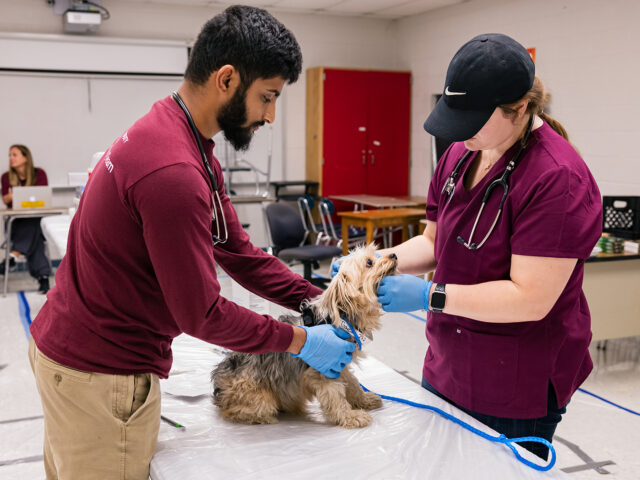As one of the largest schools of veterinary medicine in the United States, Texas A&M and the Texas A&M Veterinary Emergency Team (VET) have created the only required rotation in veterinary emergency response for fourth-year veterinary students in the nation. This unique, interactive learning experience teaches students how to develop personal and practice emergency preparedness plans, and county-level emergency response plans and participate as a member of a response team.

Educating Aggie Veterinarians
Our team provides the nation’s only required clinical education experience in veterinary medical emergency preparedness and response.
- Our education effort has received national acclaim and is one of the facets that keeps the VMBS at the forefront of veterinary medical education.
- Cutting-edge simulation techniques are used to create an exceptional educational environment for students.
- Simulations and planning exercises with county officials provide opportunities to teach students topics and skills that extend far beyond veterinary medicine.
- We provide a significant component of the veterinary medical curriculum.
- Students meet the requirements for the AVMA Veterinary First Responder Certificate.
The required fourth-year clinical rotation in emergency preparedness and response was developed as a result of the Transformative Learning experiences provided to fourth-year veterinary students during actual response deployments of our team.
- The emergency preparedness and response segments of the rotation are required.
- 20 of the 24 rotations also have a one- to two-day weekend experience with Texas A&M Task Force 1 at Disaster City.
- Several members of the VMBS faculty and staff provide instruction during the rotation.
Our rotation is also designed to teach students about the state of Texas and is one of the mechanisms for teaching and evaluating seven core competencies identified by the North American Veterinary Medical Education Consortium’s (NAVMEC) Roadmap for Veterinary Medical Education in the 21st Century. These core competencies are:

- communication;
- collaboration;
- self, team, and systems management;
- life-long learning;
- leadership;
- cultural awareness; and
- adaptation to changing environments.
Transformative Learning
Reflection essays are provided by students who have been involved in response deployments and are an integral portion of the Transformative Learning process.
Participation in emergency response teaches lessons that are difficult to teach in any other component of the veterinary medical curriculum—including:
- teamwork,
- communication,
- leadership,
- team management,
- situational awareness, and
- the value of public and community service.
Virtual Training
Students on the rotation are put into disaster scenarios via Second Life technology.
- In this virtual disaster zone, students are expected to triage and treat animals injured in the disaster.
- They must deal with multiple complications from reporters, animal owners, elected officials, and others who create chaos.
- Students must also maintain situational awareness and follow safety protocols.
- The interactive technology allows students to make medical decisions and realize the consequences of those decisions without putting them or the animals they treat in harm’s way.
View a virtual training sample >>
Please note: This video includes sensitive subject matter. View with discretion.
Student Reflections
West, Texas Deployment Reflections
Bastrop County Reflections
